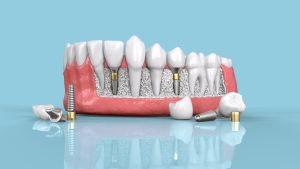The Complete Guide to Dental Implants: A Long-Lasting Solution for Missing Teeth
Losing a tooth can impact much more than your smile. It affects how you eat, speak, and can even lead to more severe dental issues if left untreated. Luckily, dental technology has advanced significantly, and today,
dental implants are recognized as one of the most reliable and long-lasting solutions for missing teeth.
In this comprehensive guide, we’ll explore everything you need to know about implants, from the procedure to the benefits and aftercare, so you can make an informed decision about your dental health.
What Are Dental Implants?
An
implant is a titanium post surgically inserted into the jawbone to replace the root of a missing tooth. Over time, the implant fuses with the bone through a process called osseointegration, creating a stable foundation for a replacement tooth (crown), bridge, or even a full set of dentures. This structure mimics the natural tooth, both in function and appearance, offering a durable and aesthetically pleasing solution.
Why Choose Implants Over Other Options?
There are several ways to address missing teeth, such as bridges or dentures, but dental implants stand out for a variety of reasons. Here’s why:
- Durability: Dental implants are built to last. With proper care, they can last a lifetime, unlike dentures or bridges, which may need to be replaced after several years.
- Bone Health: When you lose a tooth, the bone that supported it can begin to deteriorate. Implants stimulate bone growth, preventing bone loss and maintaining your facial structure.
- Natural Appearance and Feel: Implants look, feel, and function like natural teeth. They are customized to blend seamlessly with your surrounding teeth.
- Improved Functionality: Unlike removable dentures, implants are stable, making it easier to chew and speak without worrying about them slipping out of place.
- Low Maintenance: Caring for an implant is as easy as caring for your natural teeth—just brush, floss, and visit your dentist regularly.
The Dental Implant Procedure: Step-by-Step
The process of getting a dental implant typically involves multiple steps over several months, but the result is worth the wait. Here’s what to expect:
- Initial Consultation
Your journey begins with a consultation where your dentist will assess your overall dental health, review X-rays or 3D images of your jaw, and determine if you’re a good candidate for implants. If your jawbone is too thin or soft, a bone graft may be necessary to provide sufficient support for the implant.
- Implant Placement
Once you’re cleared for the procedure, the next step is placing the implant. The dentist or oral surgeon will surgically insert the titanium post into your jawbone. This is done under local anesthesia, so you’ll feel little to no discomfort. The healing process can take several months as the implant integrates with the bone, but this step is crucial for ensuring a strong foundation.
- Abutment Placement
After the implant has successfully fused with the jawbone, an abutment (a connector) is attached to the implant. This will hold the replacement tooth or crown in place.
- Placement of the Crown
The final step involves attaching the customized crown to the abutment. Your dentist will ensure that the crown matches the shape, size, and color of your surrounding teeth, giving you a natural-looking smile.
Are You a Good Candidate for Dental Implants?
While
implants are an excellent solution for many, they may not be suitable for everyone. Here are some factors your dentist will consider:
- Good Oral Health: Healthy gums and sufficient bone density are essential for supporting an implant.
- Non-Smokers: Smoking can hinder the healing process and increase the risk of implant failure.
- Commitment to Oral Hygiene: Implants require the same level of care as natural teeth. Brushing, flossing, and regular dental visits are a must.
- Overall Health: Certain conditions like uncontrolled diabetes or immune system disorders may affect the healing process, so it’s important to discuss your medical history with your dentist.
The Benefits of Dental Implants
Dental implants come with a wide range of benefits beyond just replacing a missing tooth. Here’s a closer look at the advantages they offer:
- Long-Term Solution
With proper care, dental implants are designed to last for decades, if not a lifetime. This makes them a more cost-effective option in the long run compared to dentures or bridges that may need replacement or repair over time.
- Comfort and Convenience
Implants eliminate the discomfort associated with removable dentures, such as slipping or sore spots. They are securely placed in the jawbone, offering unparalleled stability.
- Preservation of Jawbone and Facial Structure
Unlike traditional dentures, which can accelerate bone loss over time, dental implants stimulate bone growth and prevent the deterioration of the jawbone. This helps maintain your facial structure and prevents the “sunken” appearance that sometimes occurs with missing teeth.
- Improved Speech and Chewing
Missing teeth or ill-fitting dentures can make speaking or chewing difficult. Dental implants restore full functionality, allowing you to eat all your favorite foods and speak without fear of slippage or mumbling.
- Boost in Confidence
A beautiful, functional smile can do wonders for your self-esteem. Dental implants restore your ability to smile with confidence without worrying about gaps or loose dentures.
Aftercare: How to Maintain Your Dental Implants
One of the best things about dental implants is that they require no special maintenance. However, to ensure their longevity, follow these basic guidelines:
- Brush and Floss Regularly: Treat your implants as you would your natural teeth by brushing twice a day and flossing once a day.
- Regular Dental Checkups: Visit your dentist for routine cleanings and exams to ensure your implant and surrounding gums remain healthy.
- Avoid Hard Foods: While implants are strong, avoid chewing on ice or hard candies, which can damage the crown.
- Quit Smoking: Smoking can compromise the healing process and increase the risk of implant failure.
Conclusion
Dental implants offer a long-lasting, natural-looking solution for replacing missing teeth. Whether you’ve lost a tooth due to injury, decay, or other issues, implants can restore your smile and improve your quality of life. With benefits ranging from enhanced chewing ability to preserving jawbone structure, implants are a worthwhile investment in your dental health.
Contact Axcel Dental now for more information.




